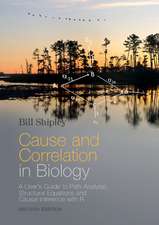Geopolitics: An Introductory Reader
Editat de Jason Dittmer, Jo Sharpen Limba Engleză Paperback – 17 iun 2014
Drawing both on academic and political material, this book introduces readers to the concept of geopolitics, from the first usage of the term to its more recent reconceptualisations. The concept of geopolitics is introduced through four thematic sections - Imperial Geopolitics, Cold War Geopolitics, Geopolitics after the Cold War and Reconceptualising Geopolitics. Each section includes key writings from a range of diverse and leading authors such as Said, Agnew, Dalby, O Tuathail, Gregory, Barnett and Kaplan, and is accompanied by a critical introduction by the editors to guide the reader through the material. This Reader establishes the foundations of geopolitics while also introducing readers to the continuing significance of the concept in the 21st century.
This Reader provides an essential resource that exposes students to original writing. The Editors provide a pathway through the material with Section Introductions to assist the readers understanding of the context of the material and impacts of the writings. The readings included draw from a range of authors, writing from a range of locations. The Reader concludes with the latest changes in geopolitical thought, incorporating feminist and other perspectives.
| Toate formatele și edițiile | Preț | Express |
|---|---|---|
| Paperback (1) | 389.22 lei 6-8 săpt. | |
| Taylor & Francis – 17 iun 2014 | 389.22 lei 6-8 săpt. | |
| Hardback (1) | 1123.37 lei 6-8 săpt. | |
| Taylor & Francis – 18 sep 2014 | 1123.37 lei 6-8 săpt. |
Preț: 389.22 lei
Nou
Puncte Express: 584
Preț estimativ în valută:
74.48€ • 77.96$ • 61.99£
74.48€ • 77.96$ • 61.99£
Carte tipărită la comandă
Livrare economică 31 martie-14 aprilie
Preluare comenzi: 021 569.72.76
Specificații
ISBN-13: 9780415666633
ISBN-10: 0415666635
Pagini: 386
Ilustrații: 1 black & white illustrations, 1 black & white line drawings
Dimensiuni: 189 x 246 x 20 mm
Greutate: 0.69 kg
Ediția:New.
Editura: Taylor & Francis
Colecția Routledge
Locul publicării:Oxford, United Kingdom
ISBN-10: 0415666635
Pagini: 386
Ilustrații: 1 black & white illustrations, 1 black & white line drawings
Dimensiuni: 189 x 246 x 20 mm
Greutate: 0.69 kg
Ediția:New.
Editura: Taylor & Francis
Colecția Routledge
Locul publicării:Oxford, United Kingdom
Public țintă
Postgraduate and UndergraduateCuprins
Section 1: Imperial Geopolitics 1. The Influence of Seapower on History Alfred Thayer Mahan 2. The Geographical Pivot of History Halford Mackinder 3. Influences of Geographic Environment Ellen Churchill Semple 4. Geopolitics and Empire Gerry Kearns 5. What Geography Ought To Be Peter Kropotkin 6. Some Rules of Satyagraha Mohandas Gandhi 7. Why Geopolitik? Karl Haushofer 8. Eastern Orientation or Eastern Policy Adolf Hitler 9. Geography versus Geopolitics Isaiah Bowman 10. Japanese Geopolitics in the 1930s and 1940s Keiichi Takeuchi 11. Orientalism Edward Said 12. America is Safe While its Boys and Girls Believe its Creeds! Jason Dittmer Section 2: Cold War Geopolitics 13. The Sources of Soviet Conduct George Kennan 14. The Domino Principle Dwight D. Eisenhower 15. Anti-Domino Patrick O’Sullivan 16. Diplomacy Henry Kissinger 17. Brezhnev Doctrine Leonid Brezhnev 18. Non-alignment in the 1970s Julius Nyerere 19. An Illustration of Geographical Warfare Yves Lacoste 20. Policy Statement Committee on the Present Danger 21. Geopolitics and Discourse Gearoid Ó Tuathail and John Agnew 22. Publishing American Identity Joanne Sharp 23. Homeward Bound Elaine Taylor May 24. Between Regions: Science, Militarism, and American Geography from World War to Cold War Trevor Barnes and Matthew Farish 25. Common European Home Mikhail Gorbachev Section 3: Geopolitics After the Cold War 26. Clash of Civilisations Samuel Huntington 27. Clash of Ignorance Edward Said 28. The Coming Anarchy Robert Kaplan 29. Reading 'The Coming Anarchy' Simon Dalby 30. The Pentagon’s New Map Thomas Barnett 31. Neoliberal Geopolitics Sue Roberts, Anna Secor and Matt Sparke 32. The Colonial Present Derek Gregory 33. What Counts as the Politics and Practice of Security, and Where? Matthew Coleman 34. Geopolitics by Another Name Caroline Nagel 35. Emerging China and Critical Geopolitics John Agnew 36. The Uncertain state(s) of Europe Luisa Bialasiewicz 37. The New Geopolitics of Disease: Between Global Health and Global Security Allan Ingram 38. Geopolitical Economy of Resource Wars Phillippe Le Billon 39. Icy Geopolitics Klaus Dodds Section 4: Reconceptualising Geopolitics A Feminist Geopolitics? Lorraine Dowler and Joanne Sharp 40. Globalized Fear? Rachel Pain 41. Geopolitics and Family in Palestine Chris Harker 42. The Question of ‘The Political’ in Critical Geopolitics Jennifer Hyndman 43. Affectivity and Geopolitical Images Sean Carter and Derek McCormack 44. After Geopolitics? Deborah Cowen and Neil Smith 45. Religion and Geopolitics John Agnew 46. Militarism, Just War, or Nonviolence? Nick Megoran 47. Anthropocene Geopolitics Simon Dalby 48. In Defence of the Heartland Colin Gray 49. The Revenge of Geography Robert Kaplan
Descriere
Drawing both on academic and political material, this book introduces readers to the concept of geopolitics, from the first usage of the term to its more recent reconceptualisations. The concept of geopolitics is introduced through four thematic sections - Imperial Geopolitics, Cold War Geopolitics, Geopolitics after the Cold War and Reconceptualising Geopolitics. Each section includes key papers from a range of diverse and leading authors such as Said, Agnew, Dalby, O Tuathail, Gregory, Barnett and Kaplan, and is accompanied by a critical introduction by the editors to guide the reader through the material. This Reader establishes the foundations of geopolitics while also introducing readers to the continuing significance of the concept in the 21st century.


















